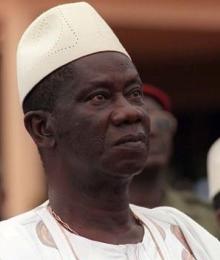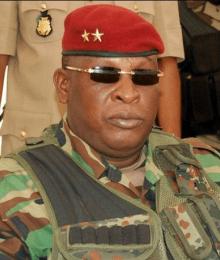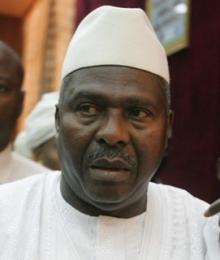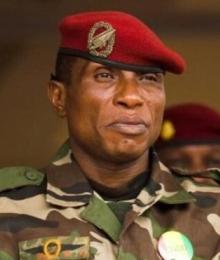
Introduction:
In the annals of Guinea's political history, the name General Lansana Conté stands out as both a symbol of stability and a subject of intense scrutiny.
As the country's longest-serving president, Conté's rule spanned over two decades and was characterized by a blend of military governance, economic challenges, and a complex legacy that still divides opinions today.
In this biography, we delve into the life and times of General Lansana Conté, exploring the impact of his rule on Guinea and its people.
Early Life and Military Career:
Lansana Conté was born on November 30, 1934, in Moussayah, a small village in northeastern Guinea. Raised in modest surroundings, he displayed exceptional leadership qualities from an early age. In pursuit of a military career,
Lansana Conté joined the French army in 1955 and received his education at the Ecole Militaire Interarmes in Senegal where he demonstrated exceptional leadership skills during his military training.
He later returned to Guinea to serve in the nascent Guinean army following the country's independence in 1958. Conté played an active role in Guinea's struggle for independence from French colonial rule and quickly rose through the ranks of the armed forces.
Lansana Conté's military prowess and loyalty to the government of Ahmed Sékou Touré played a crucial role in shaping his future political trajectory.
Rise to Power:
Lansana Conté's path to power began in April 1984 when he seized control in a bloodless military coup after the death of President Sékou Touré. He declared himself the head of the Military Committee for National Recovery (CMRN) and assumed the position of President of Guinea.
Lansana Conté promised to restore stability, improve governance, and prioritize the welfare of the Guinean people. As the head of the ruling military junta, known as the Military Committee of National Recovery (CMRN), he established himself as a key figure in Guinea's political landscape.
The coup brought an end to Sékou Touré's authoritarian regime but also signaled the beginning of Conté's rule, which would last for nearly 24 years.
Presidential Tenure:
Lansana Conté's presidency was characterized by both significant accomplishments and persistent challenges. His early years in power were marked by efforts to stabilize the economy and consolidate his rule.
He initiated economic reforms and encouraged foreign investment, leading to a period of relative stability and economic growth. Initially, he implemented some reforms, such as decentralizing power and liberalizing the economy to attract foreign investment
However, corruption, mismanagement, and a lack of transparency plagued his government, hindering economic progress and exacerbating inequality. As time went on, his administration faced criticism for corruption, human rights abuses, and the concentration of power within a small circle of loyalists.
Opposition movements emerged, calling for democratic reforms and improved governance. Conté responded with a mix of repression and limited concessions, leading to a complex political environment.
The Guinean people endured years of economic hardship, as rampant inflation, unemployment, and deteriorating public services took a toll on their daily lives.
Despite vast mineral resources, including bauxite and gold, Guinea struggled to harness its potential under Conté's leadership, leaving many citizens disillusioned and frustrated.
Legacy and Challenges:
Despite facing numerous challenges, General Lansana Conté made some notable achievements during his tenure. Under his leadership, Guinea experienced significant infrastructural developments, including the expansion of roads, schools, and hospitals. He also oversaw the modernization of the mining sector, particularly in bauxite, which boosted the country's economy.
However, his rule was marred by allegations of corruption, nepotism, and human rights abuses. Critics argue that his regime stifled political dissent, limited press freedom, and failed to address systemic issues such as poverty and unemployment. As a result, the socio-political landscape remained volatile, with periodic protests and strikes by labor unions and opposition groups.
As years went by, Conté consolidated his grip on power by amending the constitution to extend presidential term limits and securing dubious election victories. These actions further eroded the public's trust and fueled a growing sense of disillusionment.
Final Years and Succession:
Towards the end of Conté's presidency, Guinea witnessed growing discontent among its citizens due to allegations of corruption and a lack of political reforms. As Conté's health deteriorated, he faced mounting pressure to address these concerns and implement a smooth political transition.
In the final years of his presidency, Conté's health deteriorated, leading to increased speculation about his succession. On December 23, 2008, after 24 years in power, General Lansana Conté passed away due to illness, leaving a power vacuum and an uncertain future for Guinea.
Despite the challenges and controversies that marred his later years in power, his long tenure left an indelible mark on Guinea's history. Conté's presidency was characterized by stability and a commitment to economic development, which set the stage for future leaders to build upon his legacy.
Conclusion:
General Lansana Conté's presidency was a complex and controversial period in Guinea's history. While he oversaw some notable developments and economic growth, his rule was tarnished by allegations of corruption and human rights abuses.
Despite the challenges faced during his tenure, Conté's impact on Guinea's political landscape cannot be ignored. His legacy serves as a reminder of the complexities and enduring struggles of the nation's journey towards democratic governance and social progress.

















